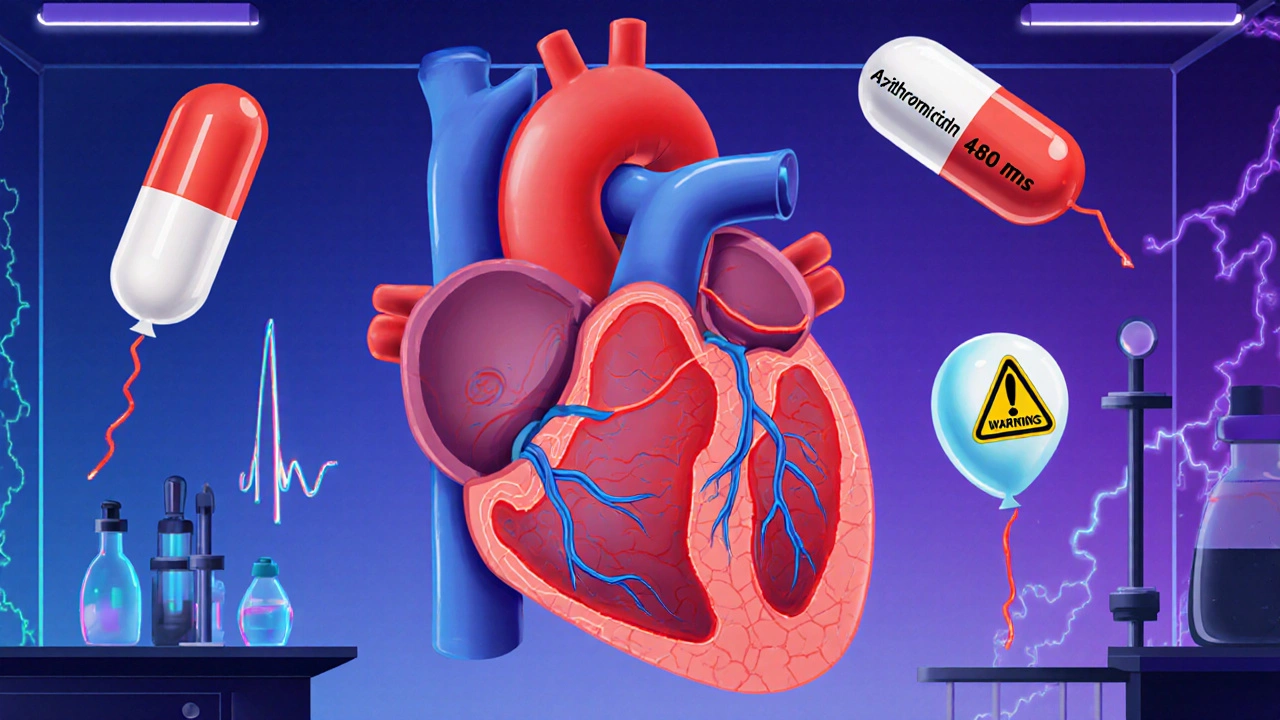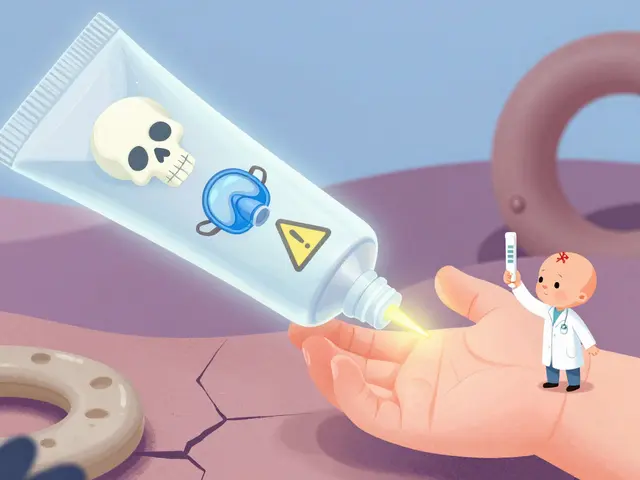QT Interval Risk Calculator
Assess Your Risk Before Starting Macrolide Antibiotics
This tool calculates your risk of QT interval prolongation when taking macrolide antibiotics like azithromycin or clarithromycin. Based on guidelines from the British Thoracic Society and American Heart Association.
Key Risk Factors (from article)
• Age over 65
• Female gender
• Kidney disease
• Other QT-prolonging drugs
• Low potassium/magnesium
• Heart disease history
• Family history of sudden cardiac death
When you’re prescribed an antibiotic like azithromycin or clarithromycin, you’re probably thinking about getting over your chest infection or sinusitis-not about your heart. But here’s the thing: these common antibiotics can quietly mess with your heart’s electrical rhythm. And if you’re one of the people at higher risk, skipping a simple ECG could be dangerous.
Why Macrolides Can Affect Your Heart
Macrolide antibiotics-like azithromycin, clarithromycin, and erythromycin-are workhorses in primary care. They’re used for pneumonia, bronchitis, ear infections, and even long-term lung conditions like bronchiectasis. But behind their effectiveness is a hidden risk: they block a specific potassium channel in heart cells (called hERG). This slows down the heart’s recovery phase after each beat, which shows up on an ECG as a longer QT interval.
A longer QT interval doesn’t sound scary, but it can lead to a dangerous rhythm called Torsades de Pointes. It’s rare-about 1 to 8 cases per 10,000 people taking these drugs-but when it happens, it can cause fainting, seizures, or sudden death. The risk jumps sharply when the QT interval goes beyond 500 milliseconds. For every 10 ms above that, your risk of a life-threatening arrhythmia goes up by 5-7%.
Erythromycin carries the highest risk, followed by clarithromycin. Azithromycin is often seen as safer, but a 2012 study in the New England Journal of Medicine found it still doubled the risk of cardiovascular death compared to amoxicillin. That’s not a small number. And it’s not just the drug itself-interactions with other meds, age, gender, and existing heart or kidney problems stack the deck.
Who Exactly Needs an ECG Before Starting Macrolides?
Not everyone needs an ECG. But if you fall into any of these groups, you absolutely should get one before starting a macrolide antibiotic:
- Women over 65-female sex increases risk by nearly 3 times.
- People over 65-age alone raises risk by 2.3 times.
- Those taking other QT-prolonging drugs-like certain antidepressants, antifungals, or antiarrhythmics. The risk multiplies when these are combined.
- People with low potassium or magnesium levels-common in diuretic users or those with eating disorders.
- Patients with known heart disease-especially heart failure, prior arrhythmias, or a history of sudden cardiac arrest.
- Anyone with a family history of unexplained fainting or sudden death-could be undiagnosed inherited Long QT Syndrome.
- People on long-term macrolide therapy-like those with cystic fibrosis or bronchiectasis who take azithromycin three times a week for months or years.
The British Thoracic Society says: if you’re starting long-term macrolide therapy for any reason, get a baseline ECG. No exceptions. That’s because they’ve seen cases where people with no symptoms had QTc values of 480 ms or higher-right on the edge-and went on to develop Torsades after a few days of treatment.
What Do Guidelines Actually Say?
There’s a big gap between what’s recommended and what actually happens.
The British Thoracic Society (BTS) guidelines from 2020 are clear: every patient getting long-term macrolide therapy must have a baseline ECG. QTc above 450 ms in men or 470 ms in women means you shouldn’t start the drug. Repeat ECGs are needed after one month to catch delayed prolongation.
But in the real world? Most GPs don’t do this. A 2024 survey of 247 UK primary care doctors found only 22% routinely ordered ECGs before prescribing azithromycin-even though 78% knew about the risk. Why? Time. Lack of clear guidance for short-term use. And the belief that “healthy people” are fine.
Here’s the problem: many of these “healthy” people aren’t. They might have undiagnosed kidney disease. Or they’re on a statin that interacts with the antibiotic. Or they’ve been vomiting and are low on potassium. These things don’t always show up in a 5-minute consultation.
In contrast, specialized respiratory clinics following BTS guidelines had 87% adherence. And they found 1.2% of patients had previously unknown Long QT Syndrome-something that could’ve killed them later if left unchecked.

The Reality of ECG Monitoring in Practice
Getting an ECG sounds simple, but it’s not always easy.
In hospitals, it’s routine. ICU patients get continuous monitoring. If the QT interval stretches too far, the drug is stopped. Clinicians know the protocol. But in outpatient clinics? It’s messy.
Many GP practices don’t have ECG machines on-site. You have to book a separate appointment. That means a 3-7 day delay before you can start your antibiotics. For someone with pneumonia, that’s a long time to wait. Some patients skip the test. Some doctors skip ordering it.
And then there’s the cost. In the UK, each ECG costs about £28.50. With over 12 million macrolide prescriptions issued annually, universal screening would cost £342 million a year. That’s not feasible. So we need smarter targeting.
That’s where risk scores come in. The American Heart Association’s 2025 update introduced a 9-point scoring system that looks at age, sex, kidney function, and other meds. A score of 4 or higher? Get the ECG. A score of 2 or lower? You’re likely low risk. This approach balances safety with practicality.
Some UK clinics are now testing point-of-care ECG devices that give results in under 5 minutes. One pilot showed treatment delays dropped from 5.2 days to just 0.8 days. That’s a game-changer.
What Happens If You Don’t Get Screened?
Most people take macrolides without issue. But for a small group, skipping the ECG can be deadly.
There’s a documented case from a Reddit thread in March 2025: a 68-year-old woman with a baseline QTc of 480 ms was prescribed clarithromycin for a lung infection. She didn’t have symptoms. No known heart disease. But after five days, she collapsed with Torsades de Pointes. She needed emergency cardioversion. She survived-but barely.
Her doctor hadn’t ordered an ECG because she was “otherwise healthy.” But she had mild kidney impairment from undiagnosed hypertension. And she was taking a low-dose statin. Two risk factors. One missed ECG. A near-death experience.
On the flip side, clinics that screen regularly report fewer adverse events. One UK hospital saw a 34% drop in drug-related arrhythmias after implementing mandatory ECGs for long-term macrolide users.
What Should You Do?
If you’re prescribed a macrolide antibiotic, ask your doctor:
- “Am I at risk for QT prolongation?”
- “Do I need an ECG before starting this?”
- “What other meds am I taking that could make this risk worse?”
If you’re on long-term therapy (like for bronchiectasis or COPD), insist on a baseline ECG and a follow-up after one month. Don’t assume you’re fine because you feel healthy.
If you’re a patient with heart disease, kidney problems, or you’re over 65, don’t wait for your doctor to bring it up. Bring it up yourself.
And if you’re a clinician: don’t rely on “common sense.” Use the guidelines. Use the risk score. Use the ECG. It’s not about overtesting. It’s about preventing one avoidable death.
What’s Changing in 2025?
The landscape is shifting. The FDA and European Medicines Agency now require QT warnings on macrolide labels. Electronic health records like Epic are starting to auto-flag patients when a macrolide is prescribed-especially if they’re on other risky drugs or have a history of heart issues.
By Q1 2025, 43% of U.S. hospitals had these automated alerts. The UK is following with pilot programs for faster, in-clinic ECGs. The goal isn’t to screen everyone. It’s to screen the right people-quickly, accurately, and consistently.
The future isn’t blanket testing. It’s smart testing. Risk-based. Personalized. And it’s already here.
Do all macrolide antibiotics carry the same heart risk?
No. Erythromycin has the highest risk of QT prolongation, followed by clarithromycin. Azithromycin is considered lower risk, but it still carries a measurable increase in cardiovascular death compared to antibiotics like amoxicillin. Even "safer" macrolides can be dangerous in high-risk patients.
Can I get an ECG at my GP’s office?
Some GP practices have ECG machines, but many don’t. You may need to be referred to a local clinic, hospital, or phlebotomy center. Point-of-care devices are becoming more common in respiratory clinics, but not yet in general practice. Ask your doctor what’s available locally.
What if my QTc is borderline-say, 480 ms?
A QTc above 450 ms in men or 470 ms in women is considered prolonged and a red flag. At 480 ms, you’re in the danger zone. Most guidelines recommend avoiding macrolides entirely at this level. Alternative antibiotics should be used. If the drug is absolutely necessary, it should only be given under close monitoring with repeat ECGs.
Is ECG monitoring only needed for long-term use?
For short courses (3-5 days), routine ECGs aren’t typically recommended-unless you have multiple risk factors. But if you’re over 65, have heart disease, kidney issues, or are on other QT-prolonging drugs, even a short course of azithromycin can be risky. In those cases, a baseline ECG is still wise.
Can I take macrolides if I have a pacemaker?
Having a pacemaker doesn’t eliminate the risk of Torsades de Pointes. Pacemakers help with slow heart rates, but they don’t prevent dangerous fast rhythms like TdP. If you have a pacemaker and other risk factors (age, kidney disease, other meds), you still need an ECG before starting a macrolide.
How long after starting the antibiotic should I get a follow-up ECG?
For long-term therapy (like weekly azithromycin for bronchiectasis), a repeat ECG is recommended one month after starting. That’s when delayed QT prolongation often appears. For short courses, follow-up isn’t usually needed unless you develop symptoms like dizziness, palpitations, or fainting.





Kent Anhari
October 29, 2025 AT 05:33Had a buddy get flagged for QT prolongation after azithromycin for a sinus infection. He’s 69, on a statin, no symptoms, thought he was fine. ECG showed 485ms. They switched him to amoxicillin and he’s good now. Never even knew this was a thing until his cardiologist called him out. Don’t assume you’re healthy just because you don’t feel sick.
Charlos Thompson
October 29, 2025 AT 23:52Oh wow, so now we’re doing ECGs before antibiotics like we’re in a dystopian hospital sci-fi flick? Next they’ll make us do a full-body MRI before taking Tylenol. Meanwhile, my grandma took erythromycin in ’98 and lived to 94. Maybe the real problem is overmedicating and underthinking.
Peter Feldges
October 31, 2025 AT 04:34It’s not about overtesting-it’s about under-preparing. The data is clear: risk stratification works. We don’t screen everyone for colon cancer, but we screen those over 50 with family history. Why should cardiac risk be any different? The BTS guidelines are evidence-based, not bureaucratic. Ignoring them because it’s inconvenient is not clinical wisdom-it’s negligence dressed up as pragmatism.
Richard Kang
November 2, 2025 AT 00:01WAIT-so if I’m a 67-year-old woman on a statin with mild kidney issues and I take azithromycin… I could DIIIIIE??? Like, just like that??? I thought antibiotics were for germs, not cardiac emergencies!!! This is insane. My doctor just handed me the script like it was a coupon for coffee. I’m calling them RIGHT NOW.
Rohit Nair
November 2, 2025 AT 05:22in india most gp dont even have ekg machine... and we still give azithromycin for every cough... i saw a guy die in a village clinic last year... they thought it was pneumonia... but his qt was 510... no one knew... just sad
Wendy Stanford
November 3, 2025 AT 16:50It’s not just about the drug. It’s about the systemic failure of medicine to treat the body as a whole. We’ve turned patients into symptom clusters, not integrated organisms. We prescribe antibiotics like they’re candy, ignore electrolyte imbalances, overlook polypharmacy, and then act shocked when someone drops dead from a silent arrhythmia. We’re not treating people-we’re managing checklists.
Jessica Glass
November 5, 2025 AT 14:34So let me get this straight. The same doctors who won’t prescribe birth control without a pelvic exam are okay giving a drug that can kill you without even checking your ECG? I’m not mad, I’m just disappointed. And also, if you’re over 65 and on meds, you’re not ‘healthy.’ You’re a walking risk profile. Stop pretending otherwise.
Krishna Kranthi
November 6, 2025 AT 07:28bro in india we just give azithro for everything... cough fever cold even if you just sneezed... and people think its magic... but the real magic is when you survive it... i know a guy who took it for a sore throat and ended up in ICU... he says he still hears the beeping machines in his dreams... lol
Lilly Dillon
November 6, 2025 AT 17:04I’m 71, on lisinopril and simvastatin, took azithromycin last year for bronchitis. No ECG. Still here. But I’m not gonna lie-I Googled it after. Now I ask. Simple. Just ask.
Shiv Sivaguru
November 8, 2025 AT 06:10Why are we even talking about this? ECGs cost money. Doctors are lazy. Patients don’t care. Just give the antibiotic. If you die, you die. It’s not like the world’s gonna stop.
Gavin McMurdo
November 8, 2025 AT 16:06Let’s be real: the healthcare system doesn’t care if you live or die-it cares about liability and cost-per-case. The fact that we’re even debating this means we’ve already lost. The guidelines exist. The data is there. The tech is available. The only thing missing is the will. And that’s not a medical failure-it’s a moral one.
Jesse Weinberger
November 8, 2025 AT 17:08QT prolongation? Sounds like something from a medical drama. I’ve taken clarithromycin three times and I’m fine. My cousin’s dog had a better ECG than my last doctor’s visit. Maybe the real issue is that doctors are just scared of lawsuits and overcompensating with tests that don’t matter.
Emilie Bronsard
November 8, 2025 AT 20:50Ask your doctor. It’s that simple. No drama. No panic. Just a question. You’re worth the five minutes.